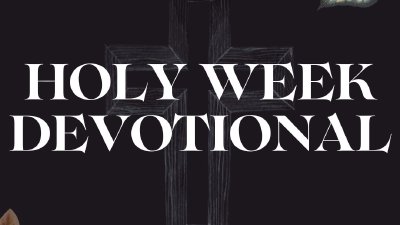Opening
Let's begin with a moment of silence, centering our minds, bodies, and hearts upon the Lord our God.
Quote
“Christ belongs to the lowly of heart, and not to those who would exalt themselves over His flock. The coming of our Lord Jesus Christ, the Scepter of God’s Majesty, was in no pomp of pride and haughtiness—as it could so well have been—but in self-abasement…” -St. Clement
Reflection
In two days, we usually meditate on the physical pain of Jesus’ crucifixion—the flogging, the crown of thorns, the slow asphyxiating agony of His death. But this pain is mingled inextricably with shame, betrayal, and the loss of a group of friends. These friends forsake each other and Christ, not because they fear death (most are willing to take part in a glorious-if-doomed Maccabean-style uprising) but because they fear dying like criminals. They fear being tarred with the same brush as their disgraced leader, rejected by Jews and Gentiles. Crucifixion is ignominy.
Humans are social beings, and Christ was fully human. His tradition, meanwhile, recognized that shame and backstabbing hurt more than physical torture. Isaiah’s speaker, the writer of Hebrews, and the psalmist are far more preoccupied with disgrace and betrayal than pain—the shame of others saying “Aha! Aha!”, beard-plucking, spitting, “hostility from sinners”—all of which come to a head in Jesus’ betrayal, rejection, and crucifixion.
Yet Christ “despised the shame” of the cross. What does that mean? He was certainly sensitive to that shame. The psalm He calls out from the cross (“My God, my God, why have you forsaken me?”) interprets disgrace and betrayal as signs that even God has betrayed the sufferer. Yet after assenting to Judas’ betrayal, on the way to having His body and reputation twisted beyond repair, Jesus says, “Now is the Son of Man glorified, and God is glorified in Him.” Christ undergoes all this as the “Son of Man,” identifying with us in our shame and betrayal, to transform our absolute ignominy, uncleanness, and loneliness into occasions for glory. In despising the shame of the cross, Christ willingly experiences it to the uttermost, and God converts it to honor and praise.
Prayer
Lord God, whose blessed Son our Savior gave His body to be whipped and his face to be spit upon: Give us grace to accept joyfully the sufferings of the present time, confident of the glory that shall be revealed; through Jesus Christ your Son our Lord, who lives and reigns with you and the Holy Spirit, one God, for ever and ever. Amen.
Reflective Practice
Reach out to the despised, rejected, the shamed in prayer and action. Focus on their social needs more than their physical needs (but meet these as well if you can). Which people in your family, social circles, or commute need most (or deserve least) to be treated as fellow humans or fellow Christians?
Read
John 13:21-32 - 21 After he had said this, Jesus was troubled in spirit and testified, “Very truly I tell you, one of you is going to betray me.”
22 His disciples stared at one another, at a loss to know which of them he meant. 23 One of them, the disciple whom Jesus loved, was reclining next to him. 24 Simon Peter motioned to this disciple and said, “Ask him which one he means.”
25 Leaning back against Jesus, he asked him, “Lord, who is it?”
26 Jesus answered, “It is the one to whom I will give this piece of bread when I have dipped it in the dish.” Then, dipping the piece of bread, he gave it to Judas, the son of Simon Iscariot. 27 As soon as Judas took the bread, Satan entered into him.
So Jesus told him, “What you are about to do, do quickly.” 28 But no one at the meal understood why Jesus said this to him. 29 Since Judas had charge of the money, some thought Jesus was telling him to buy what was needed for the festival, or to give something to the poor. 30 As soon as Judas had taken the bread, he went out. And it was night.
31 When he was gone, Jesus said, “Now the Son of Man is glorified and God is glorified in him. 32 If God is glorified in him, God will glorify the Son in himself, and will glorify him at once.




